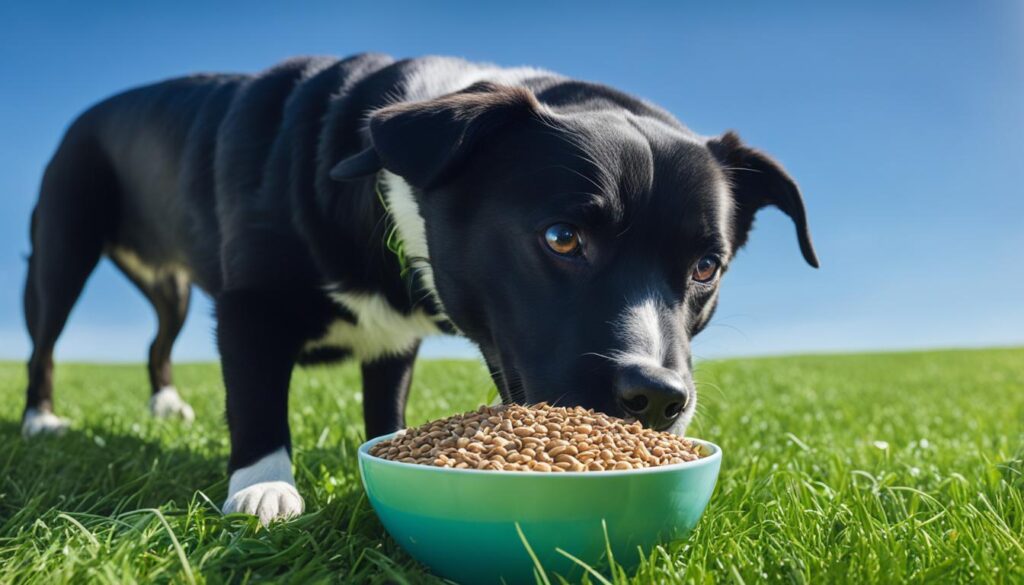Licorice is a herb that has been used for its medicinal properties for thousands of years. Licorice contains compounds like glycyrrhizin, which has anti-inflammatory effects and can benefit adrenal gland function. Licorice is safe for dogs when given in appropriate dosages based on their size. However, it is important to use licorice formulated specifically for pets or under the guidance of a veterinarian. Licorice is used in various pet supplements for conditions like hairballs, respiratory health, adrenal disorders, and irritable bowel disease.
Key Takeaways
- Dogs can safely consume licorice when given in appropriate dosages.
- Licorice contains compounds that have anti-inflammatory effects and can benefit adrenal gland function.
- It is important to use licorice formulated specifically for pets or under the guidance of a veterinarian.
- Licorice is used in various pet supplements for conditions like hairballs, respiratory health, adrenal disorders, and irritable bowel disease.
- Always consult with a veterinarian for personalized advice and recommendations.
What is Licorice Root and How Does it Benefit Dogs?

Licorice root, derived from the licorice plant, holds significant medicinal properties that can benefit dogs. The active compound in licorice root, known as glycyrrhizin, is responsible for its health benefits in canines. When given to dogs, licorice root can help alleviate various health issues and promote overall well-being.
Glycyrrhizin in licorice root possesses anti-inflammatory properties, making it effective for reducing inflammation in the gastrointestinal tract. This can aid in relieving digestive discomfort and promoting a healthy gut in dogs. Additionally, licorice root has the ability to balance cortisol levels, helping to reduce stress and promote a calm demeanor in canines.
Moreover, licorice root can be beneficial for combating skin inflammation when used topically. It can soothe and relieve itchiness, making it a useful ingredient in topical treatments for skin allergies or irritations in dogs.
Licorice root has been widely used in traditional Chinese medicine for thousands of years, where it is considered a harmonizer. Its holistic approach to balancing the body’s systems has found its way into modern veterinary practices, making it a popular choice for dogs’ health and well-being.
To administer licorice root to dogs, it is available in various forms such as herbal tea, tinctures, powdered supplements, or capsules. This provides flexibility to pet owners to choose the most suitable form for their dog’s preferences and specific needs.
Can Dogs Have Licorice Candy?

Licorice candy, like Twizzlers, is not safe for dogs. While licorice candy may sound tempting to share with your furry friend, it’s important to understand the potential risks involved. Most licorice candy does not actually contain licorice but uses anise oil as a flavoring instead. Licorice candy is often high in sugar and may also contain artificial sweeteners like xylitol, which is toxic to dogs and can lead to serious health issues if ingested.
As responsible pet owners, we must prioritize the well-being of our dogs and avoid exposing them to potentially harmful substances. Before giving any licorice candy to your dog, it is crucial to carefully read the ingredient list to ensure it does not contain any harmful ingredients such as xylitol. By doing so, you can help protect your furry companion from accidental ingestion of toxic substances.
Instead of licorice candy, there are safer alternatives that you can offer to your dog as treats. There are licorice-flavored dog treats available in the market that are specifically formulated for canine consumption. These treats are usually made with dog-friendly ingredients and do not pose the same health risks as licorice candy meant for humans. Always consult with your veterinarian to find licorice alternatives that are safe and suitable for your dog’s specific dietary needs.
Remember, the health and safety of your dog should always be the top priority. While licorice candy may be a delicious treat for humans, it is best to avoid sharing it with our four-legged companions. Opt for licorice-flavored treats specifically formulated for dogs, ensuring a safe and enjoyable experience for everyone.
Licorice Root for Allergies in Dogs

Licorice root has been found to be effective in managing allergies in dogs. With its anti-inflammatory properties, licorice root can help reduce allergic reactions in the body, providing relief for dogs suffering from allergies.
Allergies in dogs can manifest in various ways, including skin allergies, respiratory allergies, and gastrointestinal allergies. Licorice root can be used to alleviate symptoms associated with these allergies, offering much-needed comfort to dogs.
When using licorice root for allergy treatment in dogs, it is important to consider the proper dosage and safety precautions. Consulting with a veterinarian is highly recommended to ensure the appropriate use of licorice root and to determine the right dosage for your dog’s specific needs.
Licorice root can be administered to dogs in different forms, including herbal tea, tinctures, or as a supplement capsule. The chosen form will depend on your dog’s preferences and the advice of your veterinarian.
Benefits of Licorice Root for Allergies in Dogs
Licorice root offers several benefits for dogs with allergies:
- Anti-inflammatory properties: Licorice root helps reduce inflammation in the body, easing the discomfort associated with allergic reactions.
- Relief from skin allergies: Licorice root can soothe irritated skin caused by allergies, providing relief from itching, redness, and other skin-related symptoms.
- Respiratory support: Licorice root has been known to assist in managing respiratory allergies, helping to alleviate symptoms such as coughing and wheezing.
- Gastrointestinal support: Licorice root can aid in calming the digestive system and reducing gastrointestinal inflammation caused by allergies.
With its natural properties, licorice root can be a valuable tool in managing allergies in dogs. However, it is crucial to use licorice root under the guidance of a veterinarian to ensure the proper dosage and safety for your dog.
| Allergy Type | Licorice Root Benefits |
|---|---|
| Skin Allergies | Soothes irritated skin, reduces itching and redness |
| Respiratory Allergies | Assists in managing symptoms like coughing and wheezing |
| Gastrointestinal Allergies | Calms the digestive system, reduces gastrointestinal inflammation |
By incorporating licorice root as part of a holistic approach to allergy management, pet parents can help their dogs find relief from the discomfort and symptoms associated with allergies.
Licorice Root and Gut Health in Dogs

Licorice root can be highly beneficial for improving gut health in dogs. The active compounds found in licorice root help repair the mucosal barriers in the gastrointestinal tract, strengthening the gut’s defense against potential allergens and preventing them from entering the bloodstream. This is particularly crucial for dogs with leaky gut syndrome, a condition where the intestinal lining becomes permeable and can contribute to the development of allergies.
In addition to its protective properties, licorice root also promotes the growth of beneficial bacteria in the gut, restoring the balance between good and bad bacteria. This plays a significant role in maintaining a healthy digestive system in dogs. By supporting the growth of good bacteria, licorice root helps improve digestion, nutrient absorption, and overall gut function.
Licorice root can be administered to dogs in various forms, such as herbal tea, tinctures, or as a supplement capsule. It is important to follow the recommended dosage guidelines provided by a veterinarian or a holistic practitioner experienced in working with herbal remedies. This will ensure that your dog receives the appropriate amount of licorice root to support their gut health without any potential adverse effects.
Integrating licorice root into your dog’s wellness routine can offer numerous benefits for their gut health. With its protective and balancing effects on the gastrointestinal system, licorice root can contribute to the overall well-being and vitality of your furry companion.
Sprouted Seeds: A Prebiotic/Probiotic Superfood for Dogs

Sprouted seeds, like those of licorice and other plants, are a powerful prebiotic/probiotic superfood for dogs. They contain highly bio-available vitamins, minerals, enzymes, and probiotics that support a healthy gut flora in dogs.
Sprouted seeds have a higher nutritional value compared to unsprouted seeds and are easily absorbed by the body. They provide essential nutrients that contribute to overall health and well-being in dogs.
Feeding dogs sprouted seeds can contribute to the maintenance of a healthy gut and support overall digestive health. The prebiotic fibers in sprouted seeds nourish the beneficial bacteria in the gut, promoting a balanced and thriving gut microbiome.
Additionally, the probiotics naturally present in sprouted seeds help populate the gut with beneficial bacteria, further supporting digestive health and immune function in dogs.
Sprouted seeds can be added to a dog’s diet in various forms such as sprinkling them on food or incorporating them into homemade treats. They provide a crunchy texture and added nutritional value to meals, making them a beneficial and delicious addition to a dog’s daily diet.
Adding sprouted seeds to a dog’s diet can be particularly beneficial for dogs with digestive issues, such as diarrhea or constipation. The fiber and enzymes in sprouted seeds help regulate bowel movements and support a healthy digestive system.
| Sprouted Seeds | Benefits for Dogs |
|---|---|
| Alfalfa sprouts | Rich in vitamins A, C, and K, as well as calcium and magnesium. Supports bone health and immune function in dogs. |
| Broccoli sprouts | Contain high levels of sulforaphane, a compound with antioxidant and anti-inflammatory properties. Supports cellular health and reduces oxidative stress in dogs. |
| Chia sprouts | Loaded with omega-3 fatty acids, fiber, and essential minerals. Supports joint health, brain function, and overall vitality in dogs. |
| Fenugreek sprouts | Rich in fiber and antioxidants. Supports healthy digestion, metabolism, and blood sugar regulation in dogs. |
Wrapping Up: Incorporating sprouted seeds into a dog’s diet can provide significant prebiotic and probiotic benefits. The high nutritional content and easy digestibility make sprouted seeds an excellent addition to support a dog’s overall digestive health and well-being.
Nettle and Licorice Extract for Allergic Dogs
A blend of nettle and licorice extract has been found to be effective in managing allergies in dogs. Nettle has anti-allergy properties and can help protect the body from allergens. Licorice, on the other hand, has anti-inflammatory effects and can relieve inflammation in the upper digestive tract and respiratory tract. This herbal blend, when used in appropriate dosages, can help alleviate allergy symptoms in dogs.
To benefit from nettle and licorice extract, it is crucial to use extracts from reputable herbal companies that specialize in pet supplements. These companies ensure the highest quality and purity of their products, eliminating the risk of exposure to harmful contaminants.
“Nettle has long been recognized for its anti-allergy properties, working to counter histamine release and reduce itching and inflammation. Licorice, on the other hand, possesses potent anti-inflammatory effects that help soothe the digestive and respiratory systems.”
When using nettle and licorice extract for allergic dogs, it’s essential to follow the dosing instructions based on your dog’s body weight. Consulting a veterinarian knowledgeable in herbal remedies is highly recommended to determine the appropriate dosage and ensure its safety for your dog.
Using a blend of nettle and licorice extract can be a natural and holistic approach to managing allergies in dogs. By leveraging the anti-allergy and anti-inflammatory properties of both herbs, pet parents can provide relief and support for their furry companions without the potential side effects of conventional medications.
| Benefits of Nettle and Licorice Extract for Allergic Dogs | How to Use Nettle and Licorice Extract |
|---|---|
| Reduces itching and inflammation | Consult a veterinarian for personalized dosing instructions |
| Counteracts histamine release | Choose extracts from reputable herbal companies |
| Soothes the digestive and respiratory systems | Monitor your dog for any adverse reactions |
| Provides natural allergy relief | Combine with other holistic approaches for optimal results |
Licorice Root Side Effects and Precautions for Dogs

While licorice root can be beneficial for dogs, it’s essential to be aware of potential side effects and take necessary precautions. Prolonged use of large doses of licorice root can lead to water retention, electrolyte imbalances, and high blood pressure in dogs.
Side Effects:
| Side Effects | Description |
|---|---|
| Water Retention | Licorice root can cause dogs to retain excessive amounts of water, leading to bloating and swelling. |
| Electrolyte Imbalances | Large doses of licorice root may disrupt the balance of electrolytes in a dog’s body, potentially leading to abnormal heart rhythms and muscle weakness. |
| High Blood Pressure | In some cases, licorice root can elevate a dog’s blood pressure, which can be dangerous, especially for dogs with underlying cardiovascular conditions. |
Precautions:
- Dogs with hypertension, end-stage liver disease, renal disease, or heart disease should not be given licorice root.
- Licorice root has the potential to interact with certain medications, so it is crucial to consult with a veterinarian before incorporating it into your dog’s routine.
- Always use licorice root in moderation and under the guidance of a professional to ensure the appropriate dosage and minimize any potential risks.
By being aware of these side effects and taking necessary precautions, you can ensure the safe and responsible use of licorice root for your dog’s well-being.
Expert Insight:
“Licorice root can provide numerous benefits for dogs, but it’s important to remember that moderation is key. Excessive use and improper doses can lead to adverse effects such as water retention and electrolyte imbalances. Always consult with a veterinarian before introducing licorice root to your dog’s diet to ensure their safety and well-being.” – Dr. Jane Davis, DVM
Buying Licorice Root for Your Dog
When it comes to buying licorice root for your dog, there are a few important considerations to keep in mind. It is crucial to choose products that are safe, free from contaminants, and specifically formulated for pets. Here are some tips to help you make the right choice:
Choose Reputable Companies
Look for licorice root products from reputable companies that specialize in pet supplements. These companies have a reputation for producing high-quality, safe products that have undergone rigorous testing. Reading customer reviews and testimonials can also provide valuable insights into the quality and effectiveness of the products.
Check for NASC Certification
The National Animal Supplement Council (NASC) is an industry organization that sets high standards for the manufacturing of animal supplements. Look for products that bear the NASC seal, as this indicates that the company meets specific quality control requirements. NASC-certified products provide added assurance of safety and reliability.
Consider Organic Licorice Root Teas
Organic licorice root teas can be a convenient option for incorporating licorice into your dog’s diet. These teas are easily available in supermarkets and can be mixed into your dog’s food. However, make sure to choose teas without any added sugars, artificial flavors, or caffeine, as these may be harmful to your dog.
Consult with a Holistic Veterinarian
Working with a holistic veterinarian is highly recommended when introducing licorice root to your dog’s diet. They can provide guidance on the appropriate dosage and form of licorice root for your dog based on their specific health needs. A holistic veterinarian can also address any concerns or questions you may have and ensure that licorice root is safe for your dog.
Remember, while licorice root can offer various health benefits for dogs, it is important to use it responsibly and under professional guidance. By choosing high-quality products and consulting with a holistic veterinarian, you can ensure that licorice root is safely incorporated into your dog’s diet.
Whole Foods for Allergy Prevention in Dogs
Food plays a crucial role in preventing allergies in dogs. By incorporating whole foods into their diet, pet parents can help improve gut health, support the immune system, and reduce inflammation, ultimately minimizing or preventing allergies from developing. The addition of natural prebiotics, probiotics, and anti-inflammatory compounds from whole foods strengthens the body’s defenses against allergens, promoting overall health and wellbeing in dogs.
Some essential whole foods that are beneficial for allergy prevention in dogs include:
- Sprouted seeds: Sprouted seeds contain highly bio-available nutrients, enzymes, and probiotics that support a healthy gut flora. They are easily absorbed by the body and can be added to a dog’s diet in various forms, such as sprinkled on food or incorporated into homemade treats.
- Nettle: Nettle is known for its anti-allergy properties and can help protect the body from allergens. It can be incorporated into a dog’s diet through herbal blends or as a supplement.
- Licorice: Licorice has anti-inflammatory effects and can contribute to reducing inflammation in the body. It is available in various forms, such as herbal tea, tinctures, or as a supplement capsule.
- Other herbal extracts: There are several other herbal extracts, such as chamomile and turmeric, that have anti-inflammatory and immune-boosting properties. These can be beneficial additions to a dog’s diet for allergy prevention.
By including these whole foods in a dog’s diet, pet parents can provide the necessary nutrients and compounds that support a healthy immune system and promote a balanced inflammatory response. However, it’s important to consult with a veterinarian to determine the appropriate dosage and form of these whole foods for individual dogs, as each dog’s dietary needs may vary.
Adding whole foods to a dog’s diet is a proactive step in preventing allergies and promoting overall health. Remember, a balanced and nutritious diet, combined with proper veterinary care, is essential in ensuring the well-being of our four-legged friends.
Licorice and Nettle: East Meets West in Allergy Management for Dogs
Combining licorice and nettle extracts in allergy management for dogs brings together the best of Eastern and Western herbal medicine approaches. Nettle is well-known for its anti-allergy properties, while licorice has powerful anti-inflammatory effects. Through their synergistic actions, this herbal combination has been shown to effectively reduce allergy symptoms in dogs.
When incorporating licorice and nettle extracts into your dog’s allergy management plan, it is crucial to choose high-quality extracts from reputable companies. Look for products that are specifically formulated for pets and have positive reviews. Following dosing instructions provided by the manufacturer or a veterinarian is essential for achieving optimal results.
By embracing both Eastern and Western approaches in allergy management and selecting the right products, you can provide safe and effective relief for your furry companion. Licorice and nettle extracts offer a holistic solution to address your dog’s allergies and help them live a more comfortable life.
The Benefits of Combining Licorice and Nettle for Allergies in Dogs
- Nettle’s anti-allergy properties help protect the body against allergens, reducing the frequency and severity of allergic reactions.
- Licorice’s anti-inflammatory effects assist in relieving inflammation in the respiratory and digestive tracts, alleviating allergy symptoms.
- The combination of licorice and nettle extracts provides a comprehensive approach to managing allergies, addressing both the immune response and the resulting inflammation.
- By combining licorice and nettle, you can target multiple pathways involved in allergic reactions, enhancing the effectiveness of the treatment.
- This herbal blend offers a natural alternative to conventional allergy medications, minimizing the potential for side effects.
“Using licorice and nettle extracts together can provide a synergistic effect in reducing allergy symptoms in dogs.”
– Dr. Samantha Parker, DVM
By leveraging the power of licorice and nettle extracts, you can provide your dog with a comprehensive and holistic approach to allergy management. Whether your dog experiences skin allergies, respiratory allergies, or gastrointestinal allergies, this natural remedy can help alleviate their discomfort and improve their quality of life.
| Licorice and Nettle Allergy Management for Dogs | Benefits |
|---|---|
| Reduces allergic reactions | Alleviates inflammation |
| Targets multiple pathways involved in allergies | Offers a natural alternative to conventional medications |
| Relieves symptoms of skin, respiratory, and gastrointestinal allergies | Enhances overall allergy management |
When using licorice and nettle extracts for your dog’s allergies, it’s important to monitor their response and consult with a veterinarian. They can provide personalized guidance and ensure the treatment is safe and appropriate for your dog’s specific needs.
Wrapping Up
In conclusion, licorice can be a valuable herb for dogs when used correctly and under professional guidance. Its anti-inflammatory properties and support for gut health make it an excellent option for managing allergies and promoting overall well-being in canine companions.
Licorice root can be administered to dogs in various forms, including herbal tea, tinctures, and supplement capsules. However, it is essential to consider the appropriate dosage, potential side effects, and precautions before giving licorice root to dogs to ensure their safety and health.
By incorporating licorice and other whole foods into a dog’s diet, pet parents can provide their furry friends with a natural and holistic approach to support their overall health. Nevertheless, consultation with a veterinarian is always recommended to receive personalized advice and recommendations tailored to the specific needs of each individual dog.
In summary, licorice is a versatile herb with numerous potential benefits for dogs. When used responsibly and in conjunction with professional guidance, licorice can contribute to the well-being and quality of life of our beloved four-legged companions.
FAQ
Is licorice safe for dogs?
Licorice is safe for dogs when given in appropriate dosages based on their size. However, it is important to use licorice formulated specifically for pets or under the guidance of a veterinarian.
What is licorice root and how does it benefit dogs?
Licorice root is a herb that has anti-inflammatory effects and can benefit adrenal gland function. It can be used to decrease inflammation in the gastrointestinal tract, balance cortisol levels to relieve stress, and combat skin inflammation.
Can dogs have licorice candy?
Licorice candy is not safe for dogs. Most licorice candy does not actually contain licorice but uses anise oil as a flavoring instead. It is often high in sugar and may contain artificial sweeteners like xylitol, which is toxic to dogs.
How can licorice root help with allergies in dogs?
Licorice root has anti-inflammatory properties and can help reduce allergic reactions in the body. It can be used to relieve symptoms of skin allergies, respiratory allergies, and gastrointestinal allergies.
How does licorice root benefit gut health in dogs?
Licorice root repairs the mucosal barriers in the gastrointestinal tract, supports the growth of good bacteria in the gut, and helps restore the balance between good and bad bacteria. This can be especially helpful for dogs with leaky gut syndrome.
Are sprouted seeds beneficial for dogs?
Sprouted seeds, like those of licorice and other plants, are a powerful prebiotic/probiotic superfood for dogs. They contain highly bio-available vitamins, minerals, enzymes, and probiotics that support a healthy gut flora in dogs.
Can nettle and licorice extract be used to manage allergies in dogs?
Yes, a blend of nettle and licorice extract has been found to be effective in managing allergies in dogs. Nettle has anti-allergy properties, while licorice has anti-inflammatory effects.
What are the side effects and precautions of licorice root for dogs?
Prolonged use of large doses of licorice root can lead to water retention, electrolyte imbalances, and high blood pressure. Dogs with certain medical conditions should not be given licorice root, and it can also interact with certain medications.
What should I consider when buying licorice root for my dog?
When buying licorice root for your dog, it is important to choose products that are free from contaminants and chemicals. Look for pet-specific products from reputable companies that have positive reviews and are part of the National Animal Supplement Council (NASC).
Are there whole foods that can help prevent allergies in dogs?
Yes, whole foods that help improve gut health, support the immune system, and reduce inflammation can be beneficial for allergy prevention in dogs.
How does the combination of licorice and nettle extracts help with allergies in dogs?
The combination of licorice and nettle extracts blends Eastern and Western herbal medicine approaches and has been found to be effective in reducing allergy symptoms in dogs.
What are the final thoughts on licorice and dogs?
Licorice can be a beneficial herb for dogs when used appropriately and under professional guidance. It has various health benefits but also potential side effects and precautions. Always consult with a veterinarian for personalized advice and recommendations.






